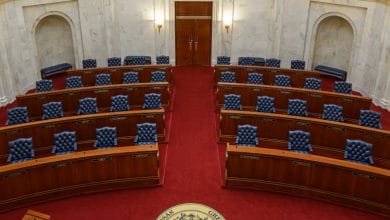 The federal government is giving Americans an additional 90 days to file and pay federal income taxes. The new federal deadline is July 15. This is in response to the COVID-19 pandemic.
The federal government is giving Americans an additional 90 days to file and pay federal income taxes. The new federal deadline is July 15. This is in response to the COVID-19 pandemic.
The question was asked of Governor Asa Hutchinson – What about the deadline for Arkansas income taxes? At least for now the answer is they are still due April 15, but officials are reviewing whether that is workable. Arkansas has some significant obstacles the federal government does not have. Those obstacles are because of when Arkansas’ fiscal year occurs and because unlike the federal government Arkansas cannot run a deficit.
If Arkansas keeps the April 15 deadline there will be much confusion because many taxpayers think the federal change also changes the Arkansas deadline. It does not.
The news is changing rapidly, so at any time we could get definite word on whether the Arkansas filing deadline will change.
What obstacle is so big that it might prevent changing the Arkansas income tax deadline? Unlike the federal government Arkansas cannot run a deficit. Arkansas must pay its bills and the budget must balance every fiscal year. Arkansas’ fiscal year ends June 30 and a new fiscal year begins July 1. Therefore, income tax collections before July 1 are part of the balance for this fiscal year. If the filing deadline is extended it puts those collections into next year and puts into question whether Arkansas can pay its bills.
Can Arkansas balance its budget this fiscal year if income tax filings are delayed into next fiscal year? We do not know. That is what state officials are now closely examining. Here are some of the factors we think they will be examining:
-
- On a positive note there is some cushion because tax collections have been running above the official state forecast. For the period July 2019 through February 2020 state revenue was up by $185.3 million, and perhaps more importantly had exceeded the state forecast $89.2 million.
- The bad news is Governor Hutchinson said for April, May, and June general revenue collections are projected to go down by $100 million or more, and that is even without a reduction in this fiscal year’s collections if the income tax deadline were to be moved into next fiscal year.
- The state has some reserve funds. Could those funds be used to get Arkansas past the fiscal year hump or will the potential demand on the reserve funds make it too dangerous to use? Pew Charitable Trust ranked Arkansas as the seventh worst in the nation for having a low reserve. The Democrat-Gazette reported, “At the end of fiscal 2019, Arkansas’ long-term reserve fund had enough money to cover 9.9 days of state operating expenses, or 2.7% of spending, according to the Pew report released Wednesday. The state said the fund had nearly $153 million.”[i]
- The state can create some cushion by cutting state expenditures now through the Arkansas Revenue Stabilization Act (RSA). In fact, a cut seems very likely. The question is how much could be cut at this late date in the fiscal year and still provide funding for essential programs and services. Under RSA the spending of general revenues is classified by importance into categories such as “A”, “B”, and “C.” When the state forecast falls below projections the Governor can cut back spending in one or more categories. This process is not unusual. Even during Governor Hutchinson’s service as governor, RSA has been used to cut expenditures. Hutchinson used revenue stabilization to cut spending but before the end of that fiscal year he was able to restore most of the spending.
Even if the state does not move the deadline, more taxpayers are likely to file for tax extensions, which will put those collections into the next fiscal year anyway. Corporations are more likely to file for extensions than individuals. The drawback to filing for an extension is interest and penalties. For the taxpayer the best result would be delay the deadline until July 15, but, if that doesn’t happen it would help some taxpayers to eliminate or reduce penalties and interest associated with filing an extension.
Determining when you should file for an extension on Arkansas taxes is also a problem. In the past, when a taxpayer filed for an extension on federal taxes the extension on state taxes has been automatic. That doesn’t mesh if the Arkansas and federal deadlines are different. Since the federal tax deadline is now July 15, a taxpayer doesn’t need to file for federal extension until then, but that is long past the deadline for filing for a state extension. Those taxpayers who realize the state extension must be filed earlier must then scramble to figure out how to do that.
Would it be any help to taxpayers if the state delayed the Arkansas deadline but not as much of a delay as for federal taxes, so collections would still be received this fiscal year? Any delay would be helpful to taxpayers; however, setting up a shorter delay still doesn’t address the confusion from having different state and federal deadlines and would even add more confusion.
We hope the state will soon announce whether the filing deadline will change.
If Arkansas does not change its income tax deadline to the federal deadline, there will be much confusion and many more taxpayers are likely to suffer from having to pay penalties and interest.
[i] https://www.arkansasonline.com/news/2020/mar/22/arkansas-said-to-lag-in-reserve-funding/?news-arkansas






